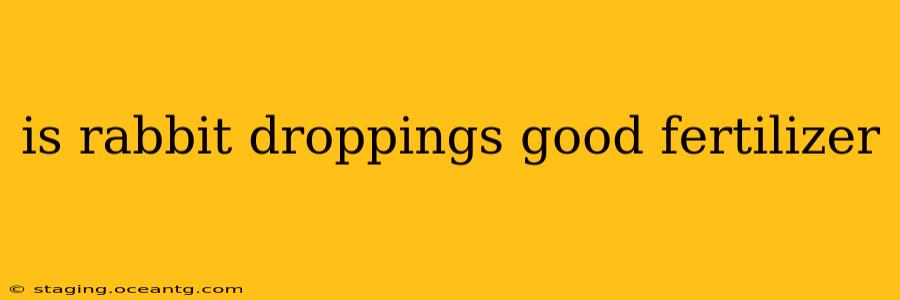Rabbit droppings, also known as rabbit manure, are a surprisingly valuable addition to your garden. Unlike the droppings of some herbivores, rabbit manure is considered a "hot" fertilizer, meaning it's relatively high in nitrogen and other nutrients that plants need to thrive. However, using it correctly is key to reaping its benefits without harming your plants. This guide explores the advantages and disadvantages, and answers common questions surrounding the use of rabbit droppings as fertilizer.
What are the benefits of using rabbit manure as fertilizer?
Rabbit droppings are a rich source of nutrients beneficial for plant growth. They contain significant amounts of nitrogen, phosphorus, and potassium – the essential macronutrients plants require for healthy development. The specific nutrient composition varies depending on the rabbit's diet, but generally, it's a well-balanced fertilizer. Compared to other animal manures, rabbit manure is relatively low in weed seeds and pathogens, reducing the risk of introducing unwanted elements into your garden. This makes it a safer option than some other types of manure. Finally, it's a sustainable and eco-friendly way to enrich your soil, reducing reliance on synthetic fertilizers.
Is rabbit poop safe to use in my garden?
While generally safe, using rabbit droppings requires caution. Fresh rabbit droppings contain high levels of nitrogen, which can "burn" your plants if applied directly. The high concentration of nitrogen can damage plant roots and leaves, stunting their growth or even killing them. Therefore, it’s crucial to compost rabbit droppings before applying them to your garden. Composting breaks down the manure, reducing the concentration of nitrogen and making it safer for your plants.
How do I compost rabbit droppings?
Composting rabbit manure is straightforward. You can add the droppings to your existing compost pile, mixing them with other organic materials like leaves, grass clippings, and kitchen scraps. The composting process naturally dilutes the nitrogen concentration and breaks down harmful pathogens. Ensure your compost pile is well-aerated to prevent anaerobic conditions, which can produce unpleasant odors and reduce the effectiveness of the composting process. A good rule of thumb is to mix rabbit droppings with other materials at a ratio of 1:3 (rabbit manure to other organic matter). The decomposition process typically takes several months, depending on the temperature and moisture levels in the compost pile.
Can I use fresh rabbit droppings directly on my plants?
No, it’s strongly discouraged to apply fresh rabbit droppings directly to your plants. The high concentration of nitrogen can damage or kill them. Always compost the droppings thoroughly before using them as fertilizer.
Are there any plants that are sensitive to rabbit manure?
While generally beneficial, some plants might be more sensitive to even composted rabbit manure than others. It's always best to start with a small amount and monitor the plants' response before applying larger quantities. Acid-loving plants, such as blueberries and azaleas, might be particularly sensitive to the alkaline nature of composted rabbit manure.
How often should I use composted rabbit manure?
The frequency of application depends on the nutrient needs of your plants and the composition of your soil. A good starting point is to apply a thin layer of composted rabbit manure around your plants once or twice a year. Observe your plants' growth and adjust the frequency accordingly. Over-fertilizing can be just as detrimental as under-fertilizing.
What are the differences between rabbit manure and other animal manures?
Rabbit manure is relatively low in weed seeds and pathogens compared to other animal manures. It also has a faster decomposition rate than some others, due to its higher nitrogen content. The nutrient composition varies across different animal manures, with rabbit manure offering a good balance of nitrogen, phosphorus, and potassium.
In conclusion, rabbit droppings can be an excellent, sustainable fertilizer for your garden. However, careful composting is essential to avoid damaging your plants. By following the guidelines outlined above, you can safely and effectively utilize rabbit manure to promote healthy plant growth and a thriving garden.
